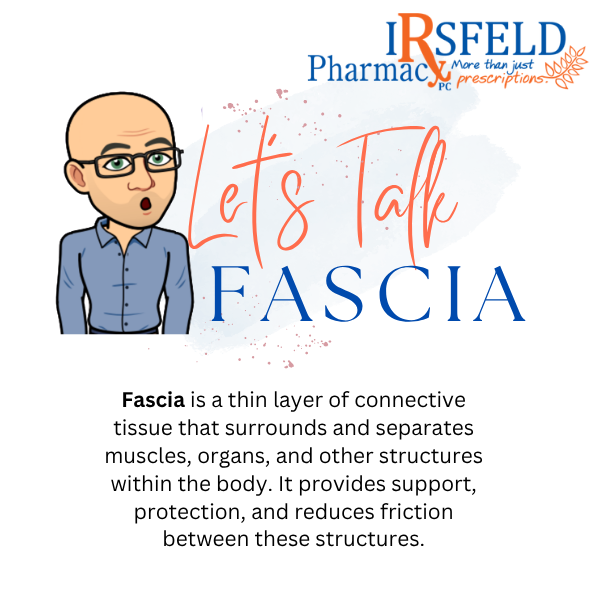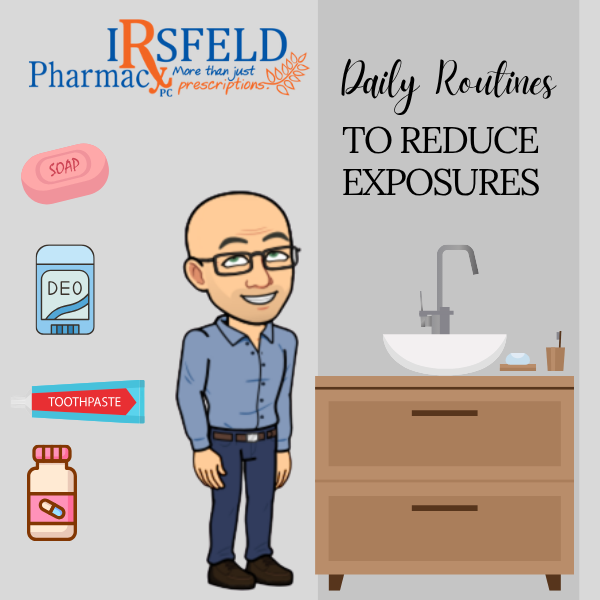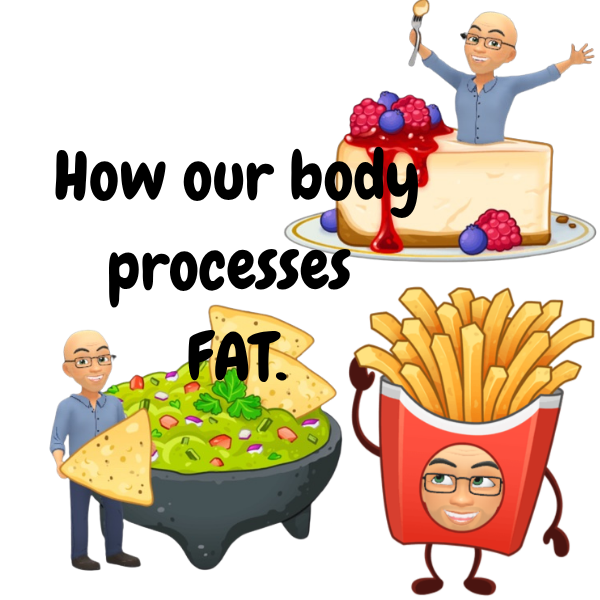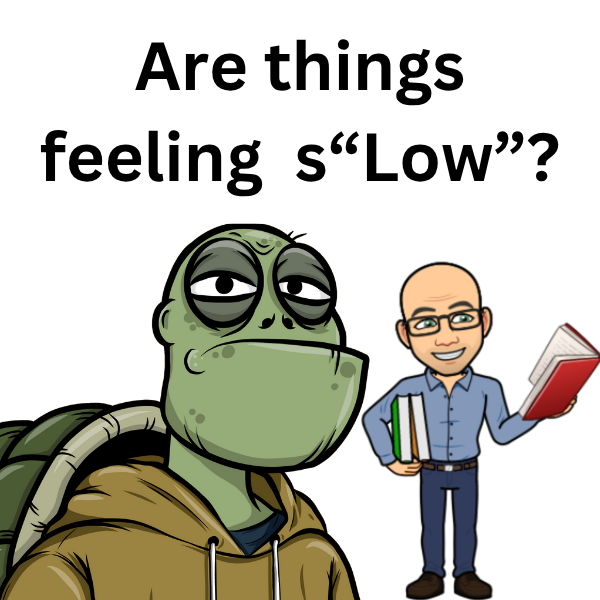By Steve Irsfeld RPh
•
July 23, 2025
Have you ever cut up meat or chicken and noticed the thin layer of film that covers the outside of what you are cutting up? That thin layer of film that covers every muscle in your body and is responsible for structure, strength, and flexibility is known as fascia. Fascia is something we don't learn much about in school, and in general, if you have a condition that involves fascia, it's kind of a big deal. When we think about our bodies, we typically focus on aspects such as bones, muscles, organs, and skin. But there's another essential part of the body that holds everything together and helps us move, feel, and stay healthy: fascia. Although it's not as well-known as other body parts, fascia plays a huge role in how we function and how we feel every day. In this article, we'll take a closer look at fascia. Fascia is a type of connective tissue that forms a continuous web throughout your body. It's made mostly of collagen, a protein that gives tissue strength and flexibility. Think of fascia like a stretchy, fibrous net or full-body suit under your skin that wraps around everything inside you—muscles, bones, organs, blood vessels, and nerves. Although it appears thin, fascia is strong and plays a crucial role in how your body moves and functions. There are three main types of fascia: Superficial Fascia – This layer is just beneath your skin. It helps cushion your body, stores fat and water, and allows your skin to move easily over the muscles. Deep Fascia – This thicker layer surrounds and separates muscles, bones, nerves, and blood vessels. It helps muscles slide over each other smoothly during movement. Visceral Fascia – This layer wraps around your internal organs, including your heart, lungs, and digestive organs, helping to keep them in place and functioning together. Where is fascia found? The short answer is, everywhere. Fascia is a full-body network that stretches from the top of your head to the tips of your toes. It surrounds individual muscles, groups of muscles, and even each muscle fiber. It also wraps around bones, joints, and organs. Because fascia connects every part of your body, a problem in one area can affect other areas. For example, tight fascia in your legs can pull on your lower back, causing pain or stiffness. • Fascia serves many vital functions that are crucial to maintaining a strong, flexible, and pain-free body. • Fascia keeps your organs, muscles, and bones in the right place. It acts like scaffolding or a framework for your body. • Healthy fascia helps muscles slide over each other easily, which is important for flexibility and coordination. • Fascia helps spread the force from one part of the body to another. For example, when you walk, the force from your foot travels through fascia to your leg, hip, and back. • Fascia helps absorb shocks and reduces friction between body parts. Fascia contains nerve endings that sense pain, pressure, and position, which helps with balance and movement control. Healthy fascia is flexible, slippery, and stretchy. But fascia can become tight, sticky, or inflamed due to injury, overuse, stress, poor posture, or even dehydration. When this happens, it can cause pain, stiffness, and other issues. Because fascia is so connected, problems in one area may cause discomfort in another. For example, tight fascia in the neck might lead to tension headaches. Several common health problems are related to fascia. Here are a few examples: • Plantar Fasciitis - This is inflammation of the fascia on the bottom of the foot, often caused by overuse, tight calves, or poor foot support. It leads to heel pain, especially in the morning or after long periods of standing. • Myofascial Pain Syndrom e - This condition involves chronic pain caused by tight areas in the fascia, called trigger points. These spots can be tender and cause pain in other parts of the body. • Fibromyalgia - While the exact cause of fibromyalgia isn't fully understood, many experts believe that fascia plays a role in the widespread pain and stiffness that come with this condition. • Post-Surgery or Injury Scarring - After surgery or injury, fascia can develop scar tissue or adhesions that limit movement and cause long-lasting pain. • Auto-immune Issues – A specific condition, Eosinophillic Fasciitis, which causes inflammation and thickening of the fascia along with scleroderma, Lupus, and rheumatoid arthritis, all of which have a fascia component. • Poor Posture or Sedentary Lifestyle - Sitting for extended periods or maintaining poor posture can cause the fascia to become stuck or shortened. This may lead to back, neck, or joint pain. The good news is that there are many simple and effective ways to care for your fascia and treat problems when they arise. • Regular movement is one of the best things you can do for your fascia. Activities like yoga, walking, or gentle stretching help keep fascia hydrated and flexible. • Using a foam roller can help release tight spots in the fascia, improve blood flow, and reduce muscle soreness. It works by applying pressure to trigger points, which allows them to relax and loosen up. • Therapies like deep tissue massage or myofascial release can help stretch and soften tight fascia. Some therapists specialize in treating fascia and know how to work with it gently and effectively. • Fascia needs water to stay soft and pliable. Drinking enough fluids each day supports healthy tissue and helps prevent stiffness. • Warm baths, heating pads, or infrared therapy can help relax tight fascia and increase circulation to the affected area. • Lowering inflammation with diet and supplementation like fish oil and curcumin are essential in taking care of your fascia. • In some cases, people may need help from a physical therapist, chiropractor, or other healthcare provider . They can offer specific treatments and exercises to target the fascia and relieve pain. Fascia is one of the most important—and often ignored—tissues in your body. It supports, connects, protects, and helps your body move the way it's meant to. When fascia is healthy, you feel flexible, strong, and pain-free. But when it's tight or damaged, it can lead to discomfort, stiffness, and chronic pain. Understanding fascia and taking care of it doesn't require anything fancy—just regular movement, good hydration, proper posture, and a little self-care. Whether you're an athlete, a student, or someone simply trying to feel better each day, maintaining healthy fascia can enhance your overall well-being and help you live a more comfortable and active life. Stop by or call the pharmacy to schedule a consultation for more information on developing a supplement regimen to address any fascia issues you may have. Please visit my website at www.irsfeldpharmacy.com to find this and other archived articles in the blog section. Until next time, be vigilant about your health!!












Share On: